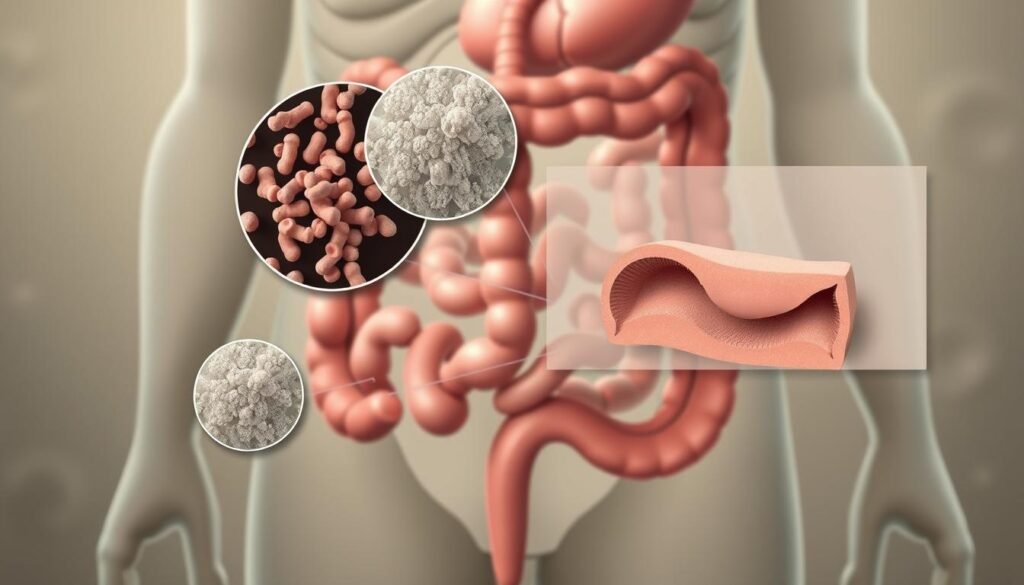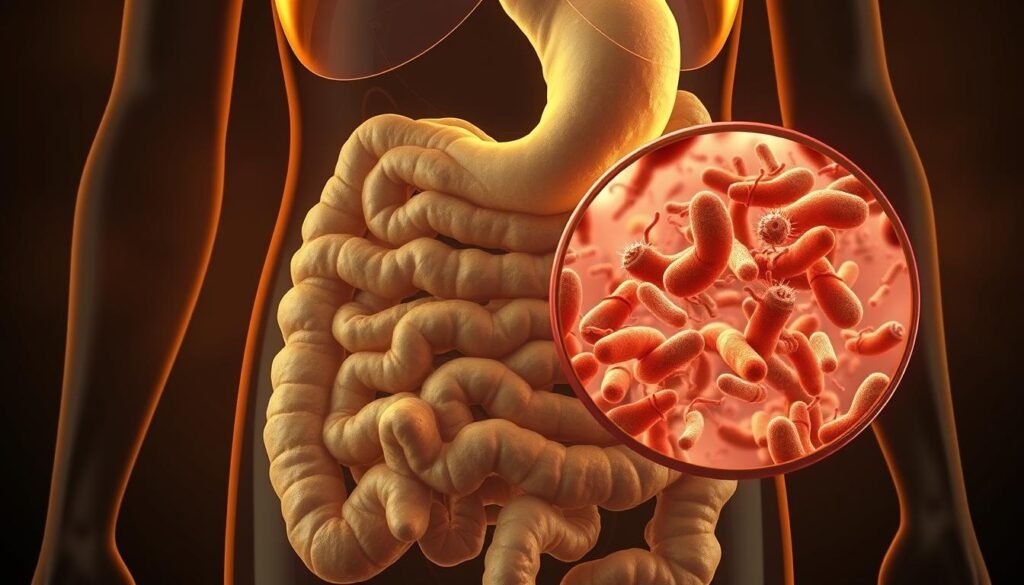The Unsettling Link Between Chronic Mucus and Gut Health: What Women Over 40 Need to Know

Constant throat mucus might not just be from allergies or a cold. It could be a sign of a deeper issue, like a problem with your digestive system. This is something women over 40 should pay attention to. Ignoring it could lead to even worse symptoms.
Women over 40 often notice changes in their digestive health. These changes can show up as chronic mucus. This symptom is often connected to problems in the gut. If not treated, these problems can get worse.
Ready to experience the benefits for yourself? Click here to get yours today
Key Takeaways
- Chronic mucus can be a sign of underlying digestive issues in women over 40.
- Gut health is closely linked to mucus production.
- Ignoring chronic mucus can lead to more severe health symptoms.
- Understanding the connection between mucus and gut health is crucial for overall well-being.
- Women over 40 should be aware of changes in their digestive health.
Understanding Chronic Mucus Production
Mucus is a natural part of our bodies. But too much of it can mean there’s a health problem. It helps keep us safe by trapping dust and germs. Yet, too much mucus can signal a health issue that needs to be looked into.
Normal Mucus vs. Excessive Mucus
Normal mucus is clear or white and you might not even notice it. But when mucus is thick, colored, and sticks around, it’s a sign of trouble. Key differences include:
- Consistency: Normal mucus is thin, while excessive mucus is thick and sticky.
- Color: Clear or white mucus is typically normal, whereas colored mucus can indicate an issue.
- Duration: Persistent mucus production is a sign of a potential health concern.
Common Misconceptions About Throat Mucus
Many think throat mucus is just about colds or allergies. But it can also point to digestive problems. Common misconceptions include:
- Believing that mucus is only related to the respiratory system.
- Assuming that all mucus is a result of infection or allergy.
It’s important to understand why we have too much mucus. This helps us tackle the real problem, not just the symptoms.
The Gut-Mucus Connection: More Than Just Allergies
Many think too much mucus comes from allergies. But, it’s really about how the digestive system and mucus interact. This connection is key for health, mainly for women over 40.
How Digestive Health Affects Mucus Production
The digestive system health is vital for mucus levels. An imbalance in gut bacteria can cause more mucus. This shows why a healthy gut is important.
Diet, stress, and the environment can upset the gut balance. This leads to too much mucus. Knowing these factors helps manage mucus issues.
The Science Behind the Gut-Mucus Relationship
Studies reveal a strong gut health connection to mucus. The gut and mucus are connected through the gut-brain axis. Signals between the gut and brain can change mucus levels.
Many factors, like the immune system and hormones, play a role. Hormonal changes in women over 40 can affect mucus levels.
Learning about the mucus and gut connection helps manage mucus. It also improves gut health.
Why Women Over40 Are Particulary Vulnerable
Women over 40 face unique challenges with their gut health. Hormonal shifts and aging play big roles. These changes can affect how their digestive system works.
Hormonal Changes and Their Impact on Gut Function
As estrogen levels drop during menopause, gut health can suffer. Estrogen helps keep the gut microbiota in balance. Without enough estrogen, the gut flora can get out of balance. This can cause more mucus and other digestive problems.
Dr. Jane Smith, a gastroenterologist, explains, “The drop in estrogen levels can disrupt the delicate balance of gut bacteria, leading to various gastrointestinal symptoms.”
Age-Related Digestive Changes
As we age, our digestive system changes. We move slower and make fewer digestive enzymes. This can cause increased mucus production and other symptoms.
Age also brings inflammation, or “inflammaging,” which can make gut health worse. A study in a leading gastroenterology journal showed older adults are more likely to have gut dysbiosis because of these changes.
It’s important for women over 40 to understand these factors. By tackling hormonal and age-related digestive issues, they can lower the risk of chronic gut health problems.
Warning Signs: When Mucus Indicates Gut Problems
Chronic mucus can be more than just a nuisance; it may signal deeper gut health issues, especialy in women over 40. While some mucus production is normal, persistent or excessive mucus can warn of digestive system problems.
Beyond the Throat: Systemic Symptoms
When mucus is linked to gut health, symptoms spread beyond the throat. Women might feel bloating, abdominal pain, and changes in bowel movements. These signs, along with chronic coughing or throat clearing, show the gut is fighting inflammation or infection.
The Progression of Symptoms if Left Untreated
If these symptoms are ignored, they can worsen, leading to serious health problems. Untreated gut problems can cause malabsorption of nutrients, weakened immune function, and even mental health issues like anxiety or depression. Women over 40 with chronic mucus and related symptoms should get medical help to tackle potential gut health issues.
Managing chronic mucus well needs a full approach. This includes changing diets, managing stress, and possibly taking supplements to support gut health. By tackling the causes of excessive mucus, women can boost their digestive health and overall well-being.
The Concept of “Internal Dampness” in Digestive Health
In Eastern medicine, “internal dampness” is key to digestive health and mucus production. It comes from an imbalance in the body’s digestive system. This imbalance causes too much mucus and fluids.
Eastern Medicine Perspectives on Mucus and Digestion
Eastern medicine says “internal dampness” comes from diet, lifestyle, and environment. A diet full of dairy, sugar, and processed foods can cause it. This leads to too much mucus.
Modern Scientific Understanding of Internal Inflammation
Modern science links “internal dampness” to chronic inflammation. Eating too much processed food and not enough fiber can upset the gut. This can cause inflammation and more mucus.
| Aspect | Eastern Medicine Perspective | Modern Scientific Understanding |
|---|---|---|
| Cause of Internal Dampness | Dietary habits, lifestyle, environmental factors | Gut dysbiosis, diet high in processed foods, low fiber intake |
| Manifestation | Excessive mucus production | Chronic inflammation, mucus production |
| Treatment Approach | Dietary changes, herbal remedies | Dietary modifications, probiotics, anti-inflammatory treatments |
Looking at “internal dampness” from both Eastern and modern views helps us understand its effects. By fixing the causes and treating holistically, we can improve our gut health.
The Unsettling Link Between Chronic Mucus and Gut Health: What Women Over40 Need to Know
Women over 40 often notice a strange connection between chronic mucus and gut health problems. This link is not just a coincidence. It’s due to how the gut microbiome and the body’s inflammation interact.
The Inflammatory Cascade: From Gut to Throat
The inflammatory process starts in the gut. An imbalance in the gut microbiome, or dysbiosis, can start inflammation. This inflammation can cause more mucus, not just in the gut but also in the throat.
The gut and throat are connected through the gut-throat axis. This connection lets inflammation spread from the gut to the throat.
When the gut is inflamed, it releases pro-inflammatory cytokines into the blood. These cytokines tell other parts of the body, like the throat, to make more mucus. This is a way to trap pathogens and protect the body. But, too much inflammation can lead to too much mucus, causing discomfort and serious health problems.

Long-term Health Implications
Chronic mucus and gut health issues can have big long-term health effects. Chronic inflammation is linked to heart disease, diabetes, and mental health issues. For women over 40, menopause adds to these risks by affecting gut health.
| Health Condition | Association with Chronic Mucus and Gut Health |
|---|---|
| Cardiovascular Disease | Chronic inflammation can increase the risk of cardiovascular disease. |
| Diabetes | Gut dysbiosis is linked to an increased risk of developing type 2 diabetes. |
| Mental Health Disorders | The gut-brain axis suggests a link between gut health and mental health conditions such as depression and anxiety. |
Ready to experience the benefits for yourself? Click here to get yours today
It’s important for women over 40 to understand the connection between chronic mucus and gut health. By improving gut health through diet, lifestyle changes, and supplements, women can reduce the risks of chronic inflammation and excessive mucus.
The Risk of “Gut Failure” and Its Manifestations
It’s key to understand the risk of gut failure for good health, mainly when dealing with chronic inflammation. Gut failure, or progressive gut dysfunction, means the gut’s health slowly gets worse. This leads to many problems in the body.
Understanding Progressive Gut Dysfunction
Progressive gut dysfunction makes the gut’s barrier weaker and its nutrient absorption worse. This can cause “leaky gut syndrome,” where toxins and undigested food can get through. This triggers an immune response and causes ongoing inflammation.
How Chronic Inflammation Leads to Systemic Problems
Chronic inflammation from gut problems can harm many parts of the body. It can cause arthritis, diabetes, and heart disease. It can also affect mental health, leading to anxiety and depression.
| Gut Health Status | Inflammation Level | Systemic Impact |
|---|---|---|
| Healthy Gut | Low | Minimal |
| Compromised Gut | Moderate | Localized Symptoms |
| Gut Failure | High | Systemic Diseases |
Ready to experience the benefits for yourself? Click here to get yours today
The table shows how gut health affects the body. It shows the dangers of gut failure. Keeping the gut healthy is vital to avoid chronic inflammation and its body-wide problems.
The Role of Diet in Managing Mucus and Gut Health
Diet is key in managing mucus and gut health, more so for women over 40. What we eat can either make mucus worse or help reduce it and inflammation.
Foods That Worsen Mucus Production
Some foods can make mucus production worse. Dairy, processed foods with sugar and unhealthy fats, and foods high in histamine like fermented foods and alcohol are culprits. Knowing which foods to skip can help manage mucus.
| Food Category | Examples | Impact on Mucus Production |
|---|---|---|
| Dairy | Milk, Cheese, Yogurt | Increases mucus production, specially in those with lactose intolerance |
| Processed Foods | Packaged snacks, Sugary drinks | Can trigger inflammation and increase mucus |
| Histamine-rich Foods | Fermented foods, Alcohol | Can worsen mucus production in sensitive individuals |
Ready to experience the benefits for yourself? Click here to get yours today
Dietary Approaches to Reduce Inflammation
Eating foods that fight inflammation can help reduce mucus and improve gut health. Foods high in omega-3s, antioxidants, and fiber are great. Think fatty fish, leafy greens, and whole grains.
Key Dietary Recommendations:
- Increase omega-3 rich foods like salmon and sardines.
- Add colorful fruits and vegetables to your meals.
- Opt for whole grains over processed ones.
By choosing the right foods, women over 40 can manage mucus better and support their gut health.
Super Greens: Nature’s Solution to Excessive Mucus?
Excessive mucus can be a big problem. But, nature has a great solution in super greens. These green superfoods are full of nutrients and might help with mucus.

The Science Behind Green Superfoods
Green superfoods, or “super greens,” are loaded with vitamins, minerals, and antioxidants. They come from green plants and algae. This makes them a powerful way to boost health and fight off too much mucus.
Key Ingredients and Their Benefits
Super greens work well against mucus thanks to their main ingredients. These include Chlorella, Spirulina, Moringa, and Barley Grass. Each one offers special benefits.
Chlorella and Detoxification
Chlorella, a type of algae, is great for detoxing. It helps clean out toxins, which can help keep your digestive system healthy and reduce mucus.
Spirulina’s Anti-inflammatory Properties
Spirulina is another algae superfood with anti-inflammatory powers. It fights inflammation, which can help cut down on mucus.
Moringa and Immune Support
Moringa is full of vitamins and minerals, boosting your immune system. A strong immune system can fight off mucus better.
Barley Grass and Digestive Health
Barley Grass is good for your digestive health. It has enzymes that help with digestion, which can lower mucus levels.
Adding super greens to your diet might help with too much mucus. Knowing how these green superfoods work can help you make smart choices for your health.
Lifestyle Changes to Support Gut Health After40
Making lifestyle changes is key to keeping your gut healthy after 40. As we get older, our digestive system works less efficiently. But, by making certain changes, women can boost their gut health and feel better overall.
Stress Management Techniques
Stress can really hurt your gut health. It can cause inflammation and mess with your gut bacteria. To manage stress well, try:
- Meditation and mindfulness practices
- Yoga and tai chi
- Deep breathing exercises
These methods not only lower stress but also help your gut stay healthy.
Exercise and Its Impact on Digestion
Regular exercise is also vital for gut health. It can make digestion better and help your gut move food more easily. Good exercises include:
- Aerobic exercises like walking or cycling
- Strength training to build muscle mass
- Flexibility exercises such as stretching
Exercise also cuts down stress and boosts gut function.
Sleep Quality and Gut Function
Getting enough sleep is crucial for a healthy gut. Bad sleep can mess with your gut bacteria and cause digestive problems. To sleep better, try:
- Keeping a regular sleep schedule
- Creating a calming bedtime routine
- Staying away from caffeine and screens before bed
Good sleep habits can greatly help your gut health.
| Lifestyle Change | Benefit to Gut Health |
|---|---|
| Stress Management | Reduces inflammation, balances gut bacteria |
| Regular Exercise | Enhances digestion, improves gut motility |
| Improved Sleep Quality | Supports gut microbiome, reduces digestive issues |
By making these lifestyle changes, women over 40 can actively support their gut health. This can greatly improve their overall quality of life.
Choosing Quality Supplements for Gut and Mucus Health
Women over 40 face a wide range of supplements. It’s important to choose high-quality ones for gut and mucus health. The right supplements can greatly improve your overall health.
What to Look for in Green Superfood Products
When picking green superfood products, look for certifications like USDA Organic or Non-GMO. Make sure the product has a variety of greens. It should also be free from fillers and additives.
Understanding “Clinical Dosing” and Bioavailability
Clinical dosing is the amount used in clinical trials. Choose products with ingredients that have been tested. Bioavailability is key; it shows how well your body absorbs the supplement.
Comparing Available Options
| Product | Key Ingredients | Bioavailability |
|---|---|---|
| Product A | Spirulina, Kale, Spinach | High |
| Product B | Wheatgrass, Broccoli | Moderate |
By considering these factors, women over 40 can make informed decisions. This supports both gut health and mucus management.
Conclusion: Taking Control of Your Gut Health After40
As women get older, keeping their gut healthy is more important than ever. The connection between mucus and gut health is complex. It’s vital to understand this to manage your health after 40.
By spotting the signs of gut issues, like too much mucus, and making smart lifestyle choices, women can lower their risk of chronic diseases. Adding stress-reducing activities, staying active, and eating a diet full of green superfoods can help your gut.
Improving gut health after 40 requires a complete plan. Choosing the right supplements, being careful with what you eat, and living a healthy lifestyle can help. This way, women can keep their gut microbiome balanced and boost their overall health.






